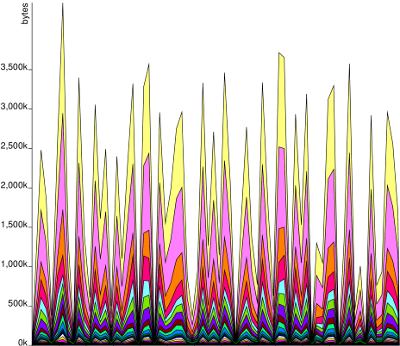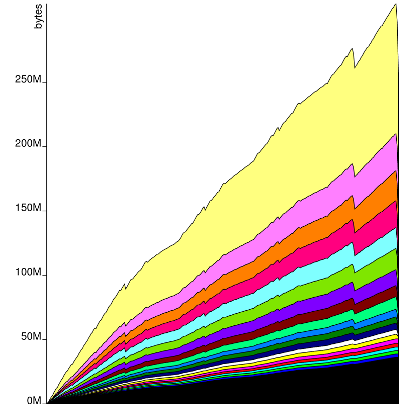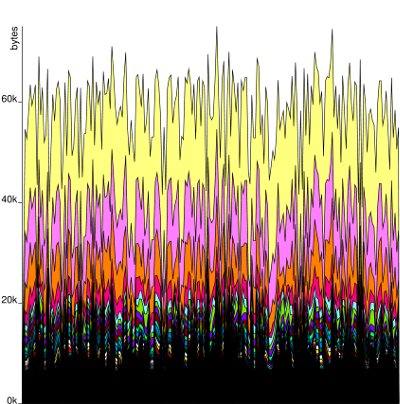tl;dr if you don’t want all the execution traces, you might now be able to run your dejafu tests with several thousand times less memory.
dejafu leans more towards correctness than performance, by default. Your test cases will be executed using the Test.DejaFu.SCT.sctBounded function, which is complete but can be slow; every result you get will have an associated trace, which can be useful for debugging, but takes up memory.
dejafu-0.7.1.0 gives you an extra knob to tweak, and 0.7.1.1 makes it even better.
Discarding results and traces (dejafu-0.7.1.0)


Full-size images: before, after.
Test cases with long traces have been a particularly bad case, as all the traces stuck around in memory until you did something with them at the end (like print the bad ones). This is such a case:
contendedMVar :: MonadConc m => m ()
contendedMVar = do
threadId <- myThreadId
mvar <- newEmptyMVar
let maxval = 150
let go = takeMVar mvar >>= \x -> if x == maxval then killThread threadId else go
for_ [1..20] . const $ fork go
fork $ for_ [1..maxval] (putMVar mvar)
takeMVar =<< newEmptyMVarI ran that 100 times with random scheduling, and the traces varied from about 2500 to 3000 elements long. That’s a lot of stuff to keep around in memory!
Sometimes you don’t want all the results or traces of your test case, you only want some of them. Now you can tell dejafu to throw things away as it’s running, allowing garbage collection to kick in sooner, and reduce the resident memory usage.
There’s a new type and some new functions:
module Test.DejaFu.SCT where
-- ...
-- | An @Either Failure a -> Maybe Discard@ value can be used to
-- selectively discard results.
--
-- @since 0.7.1.0
data Discard
= DiscardTrace
-- ^ Discard the trace but keep the result. The result will appear
-- to have an empty trace.
| DiscardResultAndTrace
-- ^ Discard the result and the trace. It will simply not be
-- reported as a possible behaviour of the program.
deriving (Eq, Show, Read, Ord, Enum, Bounded)
-- | A variant of 'runSCT' which can selectively discard results.
--
-- @since 0.7.1.0
runSCTDiscard :: MonadRef r n
=> (Either Failure a -> Maybe Discard)
-- ^ Selectively discard results.
-> Way
-- ^ How to run the concurrent program.
-> MemType
-- ^ The memory model to use for non-synchronised @CRef@ operations.
-> ConcT r n a
-- ^ The computation to run many times.
-> n [(Either Failure a, Trace)]
-- and: runSCTDiscard', resultsSetDiscard, resultsSetDiscard', sctBoundDiscard,
-- sctUniformRandomDiscard, sctWeightedRandomDiscard
-- and: dejafuDiscard, dejafuDiscardIO (Test.DejaFu)
-- and: testDejafuDiscard, testDejafuDiscardIO (Test.{HUnit,Tasty}.DejaFu)Every iteration of the SCT loop, an Either Failure a value is produced. The *Discard function variants will throw it (or its trace) away if you so tell it.
For example, you can now check that a test case doesn’t deadlock in a far more memory-efficient way like so:
dejafuDiscard
-- "efa" == "either failure a", discard everything but deadlocks
(\efa -> if efa == Left Deadlock then Nothing else Just DiscardResultAndTrace)
-- try 1000 executions with random scheduling
(randomly (mkStdGen 42) 1000)
-- use the default memory model
defaultMemType
-- your test case
testCase
-- the predicate to check (which is a bit redundant in this case)
("Never Deadlocks", deadlocksNever)A much improved DPOR implementation (dejafu-0.7.1.1)


Full-size images: before, after.
Unfortunately, 0.7.1.0 was only a win for random testing, as systematic testing explicitly constructed the tree of executions in memory. This has been a long-standing issue with dejafu, but I’d never gotten around to solving it before, because it wasn’t really any worse than what was happening elsewhere in the codebase. But now it was the worst!
The solution, in principle, was simple: you can avoid constructing the complete tree by instead exploring schedules in a depth-first fashion, which means you only need a stack and some bookkeeping information.
The implementation was fairly simple too! I like simple things.
So now we can check every possible execution of our test case for deadlocks, still in a memory-efficient fashion:
dejafuDiscard
(\efa -> if efa == Left Deadlock then Nothing else Just DiscardResultAndTrace)
-- the default way is systematic testing
defaultWay
defaultMemType
testCase
("Never Deadlocks", deadlocksNever)It’s not as memory-efficient as random scheduling, as it needs to keep around some information about prior executions, but the amount it is keeping around is greatly reduced from before.
What’s next? I don’t really know. There are still a lot of memory inefficiencies in dejafu, but they all pale in comparison to these two, so they can probably sit for a while longer. I’d like to build a suite of benchmarks, because I don’t really have any other than the test suite (which makes a poor benchmark). If you have any test cases which dejafu just can’t handle, let me know!
I think it’s fair to say that the frontiers of what dejafu is capable of have been pushed back a long way by these changes.